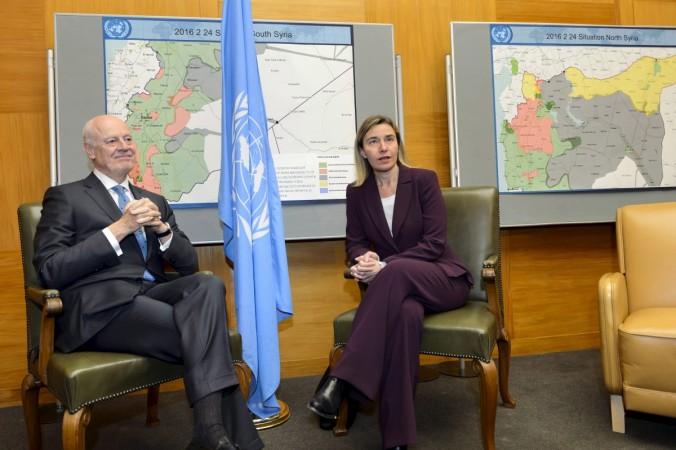
The EU sent its foreign policy chief to Geneva on Wednesday to breathe new life into Syrian peace talks, as the two sides remained at odds over the country's political future.
Federica Mogherini spoke to negotiators on both sides, and the head of the government delegation, Bashar Ja'afari, said after his meeting that he believed an impasse in the talks had been broken.
But he was told by the EU and U.N. that accelerating a political transition in Syria -- a major sticking point given fundamental disagreements between the warring parties over the fate of President Bashar al-Assad -- was the only way to defeat groups like Islamic State group.
Mogherini arrived unexpectedly on what was the penultimate day of the round of negotiations, possibly highlighting EU concerns that the talks risk getting deadlocked.
"She came to support us to engage positively in the talks that would lead to an end to the Syrian crisis," Ja'afari said after the rare meeting with a senior Western official.
"For the first time, I can tell you that we were able to break the impasse, maybe in the form and a little bit in substance."
The five-year-old conflict between the government and insurgents has killed more than 2,50,000 people, allowed Islamic State group to take control of some eastern areas and caused the world's worst refugee crisis.
With a fragile truce in place in Syria, warring sides are more than a week into talks on ending the conflict, but government officials have rejected any discussion on a political transition or the fate of Assad, who opposition leaders say must go as part of any such plan.
After the attacks in Brussels claimed by Islamic State, Ja'afari again insisted on Wednesday that fighting terrorism had to come before any discussion of political transition.
"My main message especially in meeting with that (Syrian government) delegation is the need to start a political transition in Damascus," Mogherini told reporters, stressing that there had been no change in the EU's position on the "Syrian regime".
"This in our opinion is the only way create conditions in the country to first find peace and security and secondly defeat Daesh (Islamic State)."
U.N. special envoy Staffan De Mistura echoed her comments.
"So the ball goes back to those who have been complaining about terrorism and (we're) saying what about all of you helping us to solve politically the crisis in Syria," he said.
Mogherini's visit coincided with high-level meetings in Moscow between Russian and U.S. officials, which de Mistura has said he hopes will give an impetus to the talks, just as they did by engineering a cessation of hostilities that came into effect almost three weeks ago.
COMMON GROUND DOCUMENT
Activists and diplomats said de Mistura was finalising a document to present to delegates on Thursday that will synthesise common points of convergence, but is likely to stay clear of the divisive political transition issue.
Ja'afari said he had received a document from de Mistura that his delegation would respond to at the beginning of the next round, though the government could not return before Syrian parliamentary elections on April 13.
De Mistura said on Tuesday that he aimed to establish if there were any points held in common by the different parties. If successful, he would announce these on Thursday.
Randa Kassis, representing a Moscow-backed opposition group, said de Mistura would distribute a document of common points gathered from the various delegates.
Points included creating a future unified Syrian army to fight terrorism or ensuring a democratic and non-sectarian based Syria.
"We're waiting for a U.S.-Russian accord to solve the (key) issue once and for all. Until they resolve it this process will drag on," Kassis told Reuters.
Asaad al-Zoubi, head of the HNC's delegation, whose chief coordinator Riad Hijab met de Mistura and Mogherini on Wednesday, said on Tuesday it was "obvious" there were no points of convergence with the Syrian government and accused it of renewing sieges and barrel bombing campaigns against civilians.











